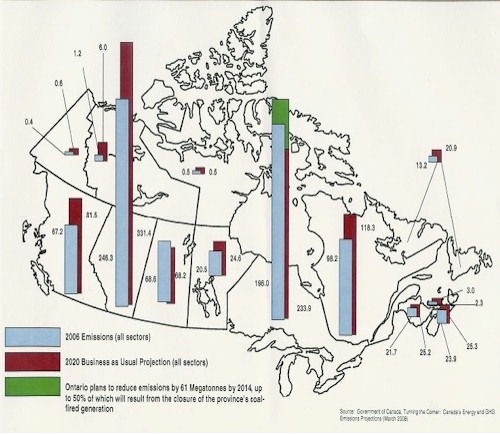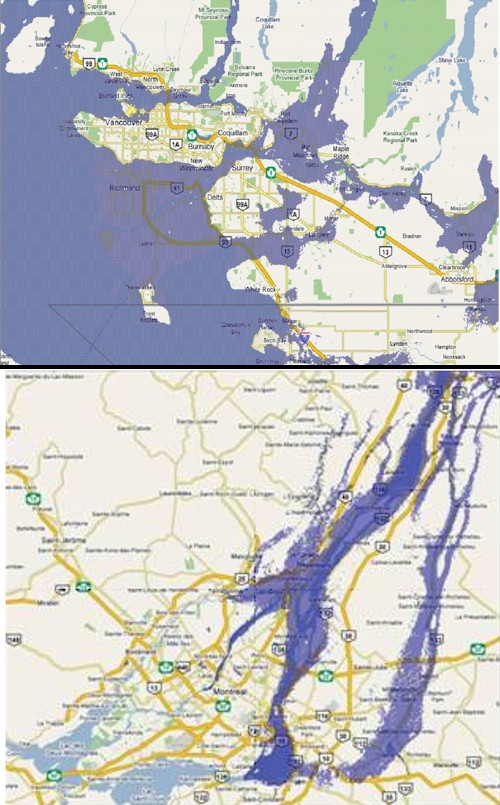 Interface Carpets’ sustainability model It’s tough explaining sustainability to executives. When it comes to knowledge, and acceptance of responsibility, they are all over the map. Surprisingly, those in the most polluting industries are often more advanced in their thinking than those in ‘service’ industries. The way to get attention for the subject, and the way to approach the issue, depends on who your audience is. My French teacher likens it to the challenge of getting a very obese man to adopt a diet. If he thinks he’s just ‘big-boned’, or thinks it’s someone else’s fault, or thinks the risks to him are non-existent or overblown, or thinks nothing will work, you have a challenge. If he’s doing his best, but it isn’t good enough, you have a challenge. If he thinks it’s just ‘his problem’, and no one else is being hurt by it, you’ve got a challenge. And let’s face it, diets are tough — hard work, lifelong change, high failure rate, and no fun. And the worst thing you can do is point out how hard it’s going to be, and how far away the goal is. I’ve spoken to a lot of business execs about this subject in recent months — delightfully, it’s part of my job. And I’ve learned that there’s a way to ‘get to’ everyone, if you listen enough first to know what approach to take. And I’ve learned that positive approaches that stress benefits and opportunities generally work better than approbation, though executives are naturally attuned to matters of business risk, if those risks can credibly be portrayed as big enough or imminent enough (a big ‘if’). So I’ve developed a Seven Steps to Business Sustainability model, which I outline below. The trick with this model is not to overwhelm or discourage businesspeople who are still at the early steps by showing them all seven. My approach is to take them through a ‘script’ to discover what step they’re currently at. If they’re like the majority, still at step 1 or 2 (or not even there), I will only talk about steps 1-3. If they’re at step 3 (about 1/3 of business execs are) they’re ready to be congratulated and introduced to steps 4-5. If they’re at step 5 (very few are) they’re ready to be nominated as sustainability leaders, and ready to look at the whole enchilada. What I like about the model is that it follows the process we all follow in dealing with threats, like forest fires or hurricanes or computer viruses. It starts with acknowledgement, and then moves on to short term and then long-term actions to cope with it. Here’s the model and the ‘script’:
I think there will be a huge market for business advisors who will be able to take companies one step at a time from step 1 to step 7. I know there are a few people (like Gil Friend) who do this. We’ll soon need a lot more. Category: Understanding Economics
|
Navigation
Collapsniks
Albert Bates (US)
Andrew Nikiforuk (CA)
Brutus (US)
Carolyn Baker (US)*
Catherine Ingram (US)
Chris Hedges (US)
Dahr Jamail (US)
Dean Spillane-Walker (US)*
Derrick Jensen (US)
Dougald & Paul (IE/SE)*
Erik Michaels (US)
Gail Tverberg (US)
Guy McPherson (US)
Honest Sorcerer
Janaia & Robin (US)*
Jem Bendell (UK)
Mari Werner
Michael Dowd (US)*
Nate Hagens (US)
Paul Heft (US)*
Post Carbon Inst. (US)
Resilience (US)
Richard Heinberg (US)
Robert Jensen (US)
Roy Scranton (US)
Sam Mitchell (US)
Tim Morgan (UK)
Tim Watkins (UK)
Umair Haque (UK)
William Rees (CA)
XrayMike (AU)
Radical Non-Duality
Tony Parsons
Jim Newman
Tim Cliss
Andreas Müller
Kenneth Madden
Emerson Lim
Nancy Neithercut
Rosemarijn Roes
Frank McCaughey
Clare Cherikoff
Ere Parek, Izzy Cloke, Zabi AmaniEssential Reading
Archive by Category
My Bio, Contact Info, Signature Posts
About the Author (2023)
My Circles
E-mail me
--- My Best 200 Posts, 2003-22 by category, from newest to oldest ---
Collapse Watch:
Hope — On the Balance of Probabilities
The Caste War for the Dregs
Recuperation, Accommodation, Resilience
How Do We Teach the Critical Skills
Collapse Not Apocalypse
Effective Activism
'Making Sense of the World' Reading List
Notes From the Rising Dark
What is Exponential Decay
Collapse: Slowly Then Suddenly
Slouching Towards Bethlehem
Making Sense of Who We Are
What Would Net-Zero Emissions Look Like?
Post Collapse with Michael Dowd (video)
Why Economic Collapse Will Precede Climate Collapse
Being Adaptable: A Reminder List
A Culture of Fear
What Will It Take?
A Future Without Us
Dean Walker Interview (video)
The Mushroom at the End of the World
What Would It Take To Live Sustainably?
The New Political Map (Poster)
Beyond Belief
Complexity and Collapse
Requiem for a Species
Civilization Disease
What a Desolated Earth Looks Like
If We Had a Better Story...
Giving Up on Environmentalism
The Hard Part is Finding People Who Care
Going Vegan
The Dark & Gathering Sameness of the World
The End of Philosophy
A Short History of Progress
The Boiling Frog
Our Culture / Ourselves:
A CoVid-19 Recap
What It Means to be Human
A Culture Built on Wrong Models
Understanding Conservatives
Our Unique Capacity for Hatred
Not Meant to Govern Each Other
The Humanist Trap
Credulous
Amazing What People Get Used To
My Reluctant Misanthropy
The Dawn of Everything
Species Shame
Why Misinformation Doesn't Work
The Lab-Leak Hypothesis
The Right to Die
CoVid-19: Go for Zero
Pollard's Laws
On Caste
The Process of Self-Organization
The Tragic Spread of Misinformation
A Better Way to Work
The Needs of the Moment
Ask Yourself This
What to Believe Now?
Rogue Primate
Conversation & Silence
The Language of Our Eyes
True Story
May I Ask a Question?
Cultural Acedia: When We Can No Longer Care
Useless Advice
Several Short Sentences About Learning
Why I Don't Want to Hear Your Story
A Harvest of Myths
The Qualities of a Great Story
The Trouble With Stories
A Model of Identity & Community
Not Ready to Do What's Needed
A Culture of Dependence
So What's Next
Ten Things to Do When You're Feeling Hopeless
No Use to the World Broken
Living in Another World
Does Language Restrict What We Can Think?
The Value of Conversation Manifesto Nobody Knows Anything
If I Only Had 37 Days
The Only Life We Know
A Long Way Down
No Noble Savages
Figments of Reality
Too Far Ahead
Learning From Nature
The Rogue Animal
How the World Really Works:
Making Sense of Scents
An Age of Wonder
The Truth About Ukraine
Navigating Complexity
The Supply Chain Problem
The Promise of Dialogue
Too Dumb to Take Care of Ourselves
Extinction Capitalism
Homeless
Republicans Slide Into Fascism
All the Things I Was Wrong About
Several Short Sentences About Sharks
How Change Happens
What's the Best Possible Outcome?
The Perpetual Growth Machine
We Make Zero
How Long We've Been Around (graphic)
If You Wanted to Sabotage the Elections
Collective Intelligence & Complexity
Ten Things I Wish I'd Learned Earlier
The Problem With Systems
Against Hope (Video)
The Admission of Necessary Ignorance
Several Short Sentences About Jellyfish
Loren Eiseley, in Verse
A Synopsis of 'Finding the Sweet Spot'
Learning from Indigenous Cultures
The Gift Economy
The Job of the Media
The Wal-Mart Dilemma
The Illusion of the Separate Self, and Free Will:
No Free Will, No Freedom
The Other Side of 'No Me'
This Body Takes Me For a Walk
The Only One Who Really Knew Me
No Free Will — Fightin' Words
The Paradox of the Self
A Radical Non-Duality FAQ
What We Think We Know
Bark Bark Bark Bark Bark Bark Bark
Healing From Ourselves
The Entanglement Hypothesis
Nothing Needs to Happen
Nothing to Say About This
What I Wanted to Believe
A Continuous Reassemblage of Meaning
No Choice But to Misbehave
What's Apparently Happening
A Different Kind of Animal
Happy Now?
This Creature
Did Early Humans Have Selves?
Nothing On Offer Here
Even Simpler and More Hopeless Than That
Glimpses
How Our Bodies Sense the World
Fragments
What Happens in Vagus
We Have No Choice
Never Comfortable in the Skin of Self
Letting Go of the Story of Me
All There Is, Is This
A Theory of No Mind
Creative Works:
Mindful Wanderings (Reflections) (Archive)
A Prayer to No One
Frogs' Hollow (Short Story)
We Do What We Do (Poem)
Negative Assertions (Poem)
Reminder (Short Story)
A Canadian Sorry (Satire)
Under No Illusions (Short Story)
The Ever-Stranger (Poem)
The Fortune Teller (Short Story)
Non-Duality Dude (Play)
Your Self: An Owner's Manual (Satire)
All the Things I Thought I Knew (Short Story)
On the Shoulders of Giants (Short Story)
Improv (Poem)
Calling the Cage Freedom (Short Story)
Rune (Poem)
Only This (Poem)
The Other Extinction (Short Story)
Invisible (Poem)
Disruption (Short Story)
A Thought-Less Experiment (Poem)
Speaking Grosbeak (Short Story)
The Only Way There (Short Story)
The Wild Man (Short Story)
Flywheel (Short Story)
The Opposite of Presence (Satire)
How to Make Love Last (Poem)
The Horses' Bodies (Poem)
Enough (Lament)
Distracted (Short Story)
Worse, Still (Poem)
Conjurer (Satire)
A Conversation (Short Story)
Farewell to Albion (Poem)
My Other Sites







I take my hat off to you Dave. A thoroughly adept job of pulling together all the threads and packaging them up to be adapted and presented to business leaders, and possibly local municipal leaders. When you read this one realises this is TOTALLY NEW THINKING. It takes a true genius to see new angles and put them into workable solutions.
just another view – i think sometimes it helps to put people in your illustrations. I drew this after watching the video you linked to on how to draw problems.http://bhyve.com/images/stories/steve/the%20problem2.jpgthe solution picture is easy – how to get there is trickier.
We all need to learn, consider, and integrate the following laws in all parts of our lives:The Laws of Ecology:”All things are interconnected. Everything goes somewhere. There’s no such thing as a free lunch. Nature bats last.” by Ernest CallenbachIt’s really that simple. The hard part is living and doing business with this in mind. The reason I come back to these laws again and again is because they are laws and we can not get around them. Every cheap and easy solution with which we try to wiggle our way out of responsibility for our planet is discredited by them.
Dave – you might find this article useful http://www.vistage.com/featured/the-roi-of-going-green-a-ceos-rationale-for-adopting-sustainability.html
There are a lot of people in the US who are in denial about climate change, partly because of misinformation put out by moneyed and political interests. I hope that enough of us become more aware that critical steps can be insisted upon by the populace before it’s too late. Among those who aren’t in denial I do see a kind of green revolution in progress — but I also see corporations doing a lot of green-washing that may be fooling a lot of the conscientious public who don’t pay close enough attention to how they spend, consume, and vote — and what propaganda they believe.I think that deliberately spreading misinformation about climate change should be considered a serious fraudulent and life-threatening crime.
I have to join Stephen up here and congratulate Dave for the remarkable post. I want to become one of the business advisors mentioned at the end of the post. Anybody in Vancouver already working on it? I would love to get in touch.
Giuseppe .. I am in Vancouver and I am working on ways to become some form of advisor as Dave suggests. I can be reached via the email address at the bottom of this page …